Why food matters for SAT prep (and no, coffee isn’t the whole story)
You’ve practiced reading passages, timed your problem sets, and learned the shortcuts that save minutes on test day. But all of that effort can be undermined by one overlooked variable: what you eat. The brain is metabolically greedy — it uses roughly 20% of your body’s energy even though it’s only about 2% of your mass. That means the meals and snacks you choose during weeks of prep (and on test day) directly affect concentration, memory consolidation, reaction time, and mood.
This guide is built for students preparing for the Digital SAT. It’s practical, friendly, and full of real-world strategies you can try tomorrow morning. I’ll walk you through the best types of brain-boosting foods, how to combine them into meals and snacks, when to eat for maximal focus, and how to tailor all this around your study schedule. Along the way, you’ll find quick recipes, a sample weekly plan, and a compact table you can screenshot and pin on your fridge. And if you want personalized study planning that pairs tutoring and nutrition focus, Sparkl’s personalized tutoring can help form study routines that include healthy habits like these.
How food helps — the basics you should know
Before diving into lists and recipes, let’s translate a few biology basics into actionable tips:
- Glucose is fuel, not a villain: The brain runs on a steady supply of glucose. That doesn’t mean sugary snacks are best — it means steady, slow-release carbs plus some protein and fat are ideal for long study sessions.
- Fats protect and support cognition: Omega-3 fatty acids (think: fatty fish, walnuts) are building blocks for brain cell membranes and help support memory and processing speed.
- Protein powers neurotransmitters: Amino acids from protein help form neurotransmitters like dopamine and serotonin, which affect motivation and calmness.
- Micronutrients matter: Vitamins and minerals — particularly B vitamins, iron, magnesium, zinc, and vitamin D — play roles in attention, memory, and energy.
- Hydration = focus: Even mild dehydration reduces cognitive performance. Water is simple, free, and critical.
Top brain-boosting foods for SAT prep (and why they work)
Here’s a concise list of foods that have a strong track record in supporting attention, memory, and steady energy during study blocks. Mix and match them — variety is key.
1. Oats and whole grains
Why: Slow-release complex carbs provide a sustained glucose supply so you don’t crash mid-essay. Try overnight oats with Greek yogurt and berries for a high-satiety breakfast.
2. Fatty fish (salmon, sardines, trout)
Why: Rich in EPA and DHA (omega-3s) that support neuronal function and mood. Two small servings a week is a good target for most teens.
3. Eggs
Why: Eggs contain choline, an important nutrient for memory and learning, plus high-quality protein to keep you alert for math sections.
4. Nuts and seeds (walnuts, almonds, pumpkin seeds)
Why: Portable, calorie-dense sources of healthy fats, magnesium, and zinc. They’re perfect for study-break snacks when you need a quick pick-me-up without sugar.
5. Berries (blueberries, strawberries)
Why: High in antioxidants and phytonutrients linked to improved memory in both short- and long-term studies. Toss into yogurt, oatmeal, or a smoothie.
6. Leafy greens (spinach, kale)
Why: Excellent sources of folate and vitamin K, which support cognitive function. Add a handful to a smoothie or make a quick salad before an afternoon practice test.
7. Greek yogurt and cottage cheese
Why: Great protein sources that are gentle on the stomach and pair well with fruit or nuts for balanced snacks.
8. Dark chocolate (70% cocoa or more)
Why: In small amounts, dark chocolate improves blood flow and can boost mood and alertness. A square after a study block is a nice reward.
9. Beans and legumes
Why: Steady-release carbs and protein plus fiber — ideal for sustained energy during longer practice tests.
10. Water, herbal tea, and electrolyte-rich drinks (sparingly)
Why: Hydration supports attention and processing speed. Plain water is best; herbal tea or diluted electrolyte drinks help for long sessions or hot days.
How to build a study-friendly plate: simple rules
When you sit down to eat during SAT prep, follow these easy rules to keep your brain humming:
- Combine a complex carb + protein + healthy fat. Example: whole-grain toast + peanut butter + banana.
- Prioritize variety. Different colors on your plate usually mean different beneficial nutrients.
- Aim for balanced snacks that won’t spike blood sugar: fruit + nuts, Greek yogurt + berries, hummus + veggies.
- Time meals to your study sessions. Eat 60–90 minutes before a practice test to let digestion settle.
- Use small, frequent meals or snacks on long study days to maintain steady energy without sluggishness.
When to eat during your study day
Timing matters almost as much as what you eat. Here’s a sample rhythm that many students find effective. Tweak it to your sleep schedule and peak focus times.
- Morning (60–90 minutes before morning study/test): Balanced breakfast with slow carbs + protein + fat (e.g., oatmeal with nuts, berries, and milk).
- Mid-morning break: Water + small snack (apple slices and almond butter).
- Lunch: Lean protein (chicken, tofu), whole grains (brown rice or quinoa), and veggies.
- Afternoon study session: Snack ahead of time (Greek yogurt with granola) and hydration.
- Pre-evening practice: Light meal 60–90 minutes before to avoid sluggishness (salmon salad with sweet potato).
- Evening wind-down: Keep it lighter if you study late; chamomile tea and a protein-rich snack help with sleep quality.
Quick study-day meal ideas (fast, tasty, effective)
Here are actual combos you can prepare in 5–15 minutes — perfect for busy students.
- Overnight oats: rolled oats, Greek yogurt, milk (or plant milk), chia seeds, mixed berries, drizzle of honey.
- Egg and avocado toast: whole-grain bread, mashed avocado, a poached egg, and a sprinkle of pepper.
- Protein smoothie: spinach, frozen berries, banana, Greek yogurt, a scoop of nut butter, water or milk.
- Mediterranean bowl: canned tuna or chickpeas, cherry tomatoes, cucumber, olives, olive oil, lemon, served over quinoa.
- Snack box: hard-boiled egg, apple slices, handful of walnuts, baby carrots.
Sample weekly plan for focused SAT prep
Below is a simple, student-friendly weekly plan. It balances performance foods with realistic prep schedules so you’re not living on kale and regret.
| Day | Breakfast | Lunch | Snack | Dinner |
|---|---|---|---|---|
| Monday | Oatmeal, blueberries, walnuts | Turkey wrap, spinach, whole-wheat tortilla | Greek yogurt + honey | Grilled salmon, sweet potato, steamed broccoli |
| Tuesday | Eggs, whole-grain toast, orange | Quinoa salad with chickpeas | Apple + peanut butter | Stir-fry tofu, brown rice, mixed veggies |
| Wednesday | Smoothie (spinach, banana, berries) | Leftover salmon bowl | Mixed nuts | Chicken, roasted veggies, quinoa |
| Thursday | Greek yogurt, granola, raspberries | Hummus, pita, cucumber & tomato | Dark chocolate square + almonds | Bean chili, cornbread |
| Friday | Chia pudding, kiwi | Salad with tuna and avocado | Carrots + hummus | Pasta with veggies & olive oil (light portion) |
| Saturday | Pancakes made with oat flour, berries | Veggie burger on whole-grain bun | Trail mix | Grilled shrimp, couscous, salad |
| Sunday | Scrambled eggs, sautéed spinach | Leftover chili or soup | Fruit salad | Roasted chicken, roasted root vegetables |
Smart snacking for practice tests and review sessions
Snacks are the unsung heroes of long study days. The right one keeps you sharp; the wrong one turns focus into a sugar crash. Here are go-to snacks with quick why-it-works notes:
- Trail mix (no candy) — healthy fats + complex carbs
- Banana + nut butter — fast energy with protein
- Hummus + bell pepper slices — fiber + protein
- Greek yogurt + berries — protein + antioxidants
- Whole-grain crackers + cheese — balanced macro mix
What to avoid: foods that harm concentration
Some foods and habits will break your momentum faster than any tough passage:
- High-sugar, low-protein snacks (candy, pastries): short-lived energy then crash.
- Heavy, greasy fast food before study: can make you sleepy and foggy.
- Over-caffeinating late in the day: may disrupt sleep and impair memory consolidation.
- Skipping meals: leads to irritability and poor concentration.
Test-day nutrition: a calm, confident routine
For the Digital SAT, you want an approach that steadies nerves and fuels focus without surprises. Here’s a straightforward, test-day plan:
- Night before: A balanced dinner (protein + complex carbs + vegetables) and a good night’s sleep — the single most important prep activity.
- Morning of: Breakfast 60–90 minutes before the test: oatmeal or whole-grain toast with eggs/avocado, and a piece of fruit. Hydrate early.
- During breaks: Small, balanced snacks — a banana or handful of nuts, water. Avoid heavy meals between sections.
- After the test: Replenish with a protein-rich snack and water to recover energy.
Sleep, stress, and the full performance picture
Remember: nutrition is one piece of the performance puzzle. Sleep quality, stress management, and study strategies are equally important. Late-night cramming with energy drinks may seem tempting, but it undermines memory consolidation and reaction time. Manage stress with breathwork, short walks, and predictable routines. If you’re working with a tutor or study coach, ask them to help build balanced habits into your schedule — Sparkl’s personalized tutoring includes structured study plans that can integrate healthy routines like these, pairing 1-on-1 guidance with small habit coaching.
Practical tips for busy students (shopping, prepping, staying consistent)
You don’t need a health-food budget or a chef to eat well. Here are realistic ways to make brain-boosting nutrition part of your everyday routine:
- Prep bowls on Sunday: cook quinoa, roast veggies, and portion into containers for grab-and-go lunches.
- Buy portable proteins: string cheese, boiled eggs, and single-serve Greek yogurt are study-hall friendly.
- Keep a hydration bottle on your desk and set a 30-minute timer to sip.
- Swap sugary drinks for sparkling water with lemon for variety without the crash.
- Start small: add one brain-boosting snack to your day and build from there.
Real students, real results — how pairing study and nutrition helps
Students who pair structured study plans with consistent fueling routines report clearer focus during practice tests, steadier moods, and more consistent energy across long study days. In coaching sessions, tutors often help students create not only question strategies but also daily habits that sustain performance — from timed practice to eating and sleeping patterns. If you want help creating a study routine that includes nutrition and pacing, Sparkl’s personalized tutoring provides tailored study plans and expert tutors who can help you shape habits that stick. 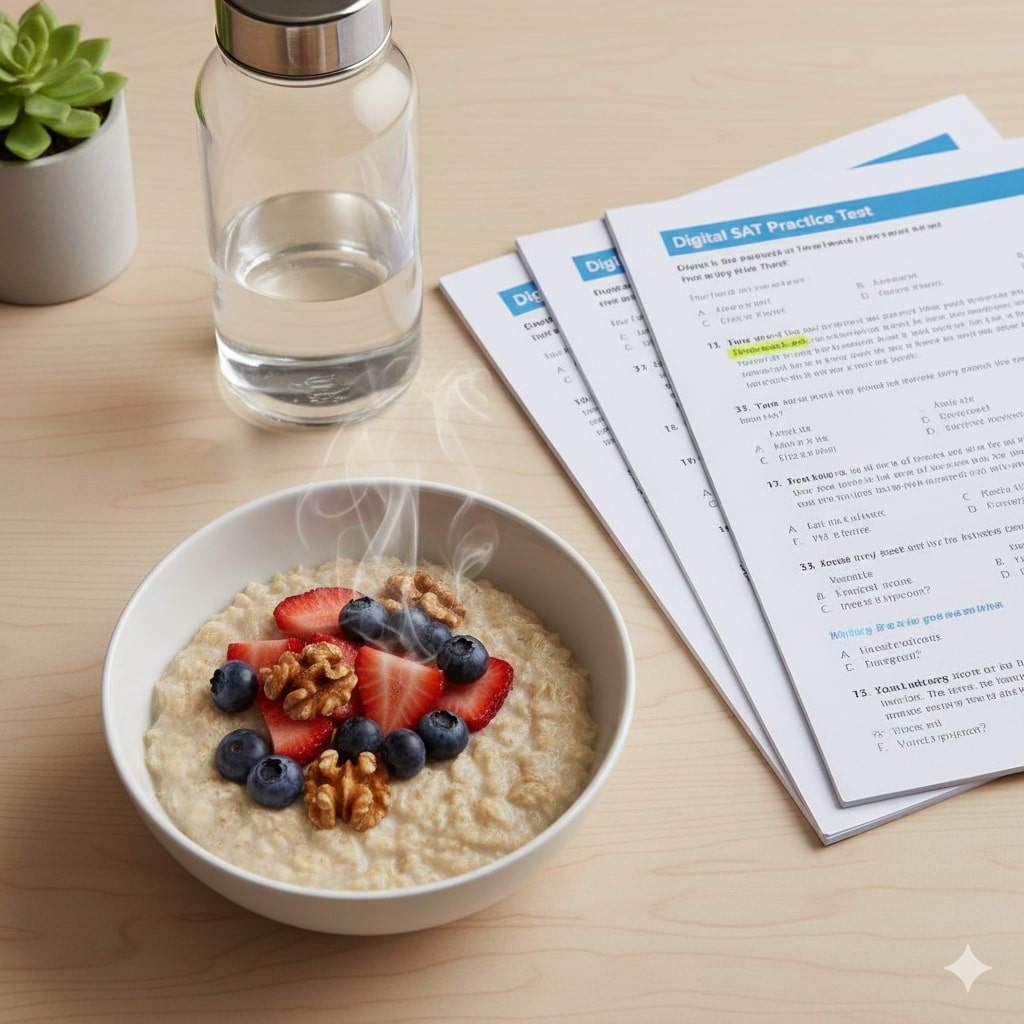
Sample grocery list for a week of SAT-focused meals
Keep this list on your phone when you shop. It’s simple, affordable, and designed to make it easy to prepare the meals above.
- Rolled oats, whole-grain bread, brown rice or quinoa
- Eggs, Greek yogurt, cottage cheese
- Leafy greens (spinach or kale), mixed salad veggies
- Berries (fresh or frozen), bananas, apples
- Salmon or canned tuna, tofu or lean chicken
- Nuts and seeds: walnuts, almonds, pumpkin seeds
- Olive oil, hummus, canned beans
- Dark chocolate (70%+), herbal teas
When to consider a professional (and what they can offer)
If you struggle with persistent fatigue, attention problems, or appetite changes despite solid sleep and diet, consider speaking with a school counselor, registered dietitian, or your doctor. They can check for underlying issues (like iron or vitamin deficiencies) and give personalized guidance. For study-related behavior change, a skilled tutor or study coach — such as Sparkl’s tutors who blend personalized study plans with accountability — can help you form predictable habits that combine study strategy and healthy routines.
Closing thoughts: small changes, big test-day differences
Eating for improved focus isn’t about strict diets or expensive supplements. It’s about reliable, simple choices: steady carbs, lean protein, healthy fats, hydration, and sleep. These small adjustments add up. By pairing clear study plans with consistent fueling, you’ll show up to the Digital SAT with better concentration, calmer nerves, and the energy to think clearly when it matters most.
Want help building a study schedule that includes nutrition, pacing, and practice tests? Consider asking a tutor to make a week-by-week plan that includes meal timing and snack strategies — it’s one of those small supports that often makes a big difference. Sparkl’s personalized tutoring offers expert tutors and tailored study plans that naturally incorporate healthy habits, which can help you turn consistency into confidence.
Quick checklist to start tomorrow
- Plan one brain-boosting breakfast (e.g., oats + berries) for the next morning.
- Pack one balanced snack (nuts + fruit) for your afternoon study block.
- Hydrate: set a refill reminder on your phone for every 2–3 hours of studying.
- Schedule 7–9 hours of sleep and stick to it — sleep is non-negotiable for memory.
- If you want a customized plan, consider scheduling a session with a tutor who can build study and nutrition into one achievable routine.
Final note
You don’t have to be perfect — you just have to be consistent. Start with small, sustainable swaps and use your study plan as the backbone that keeps nutrition, sleep, and practice aligned. Show up rested, fueled, and confident on test day, and you’ll give yourself the best chance to shine.
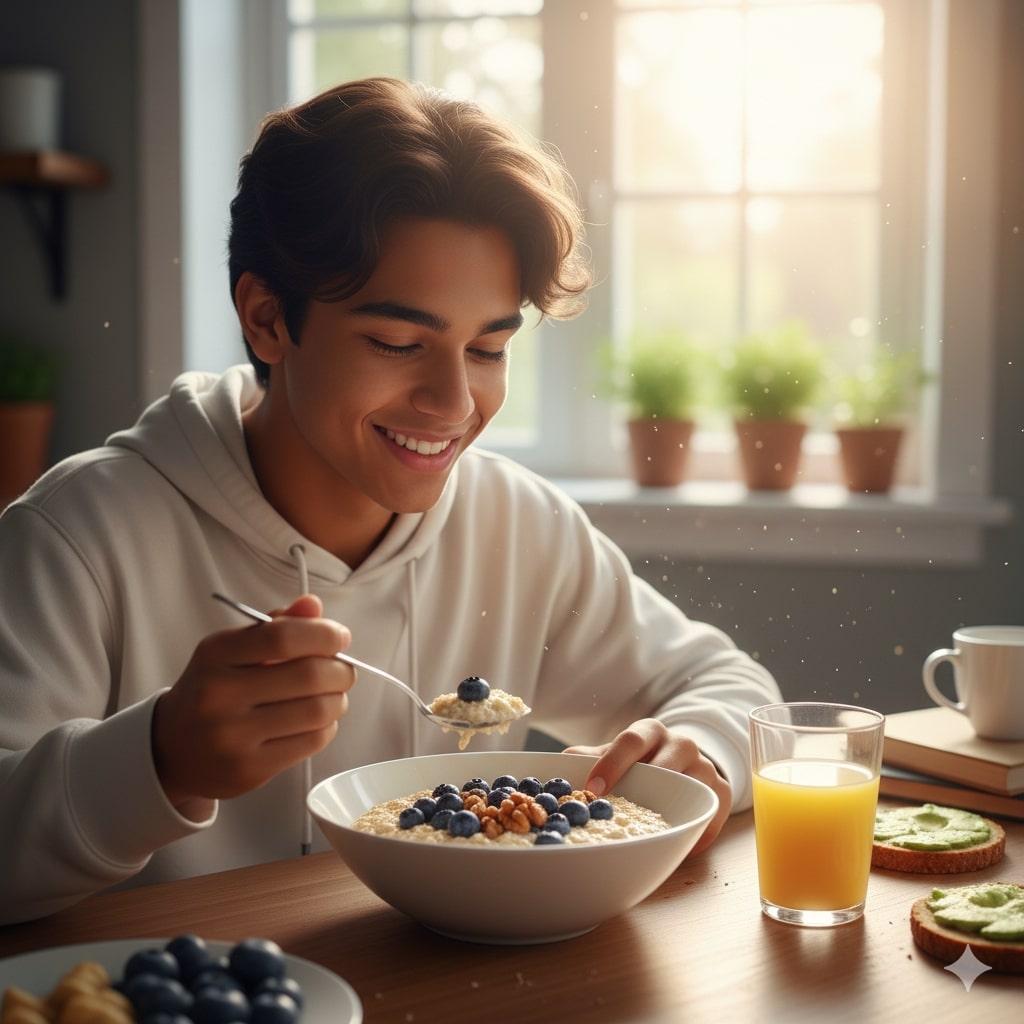


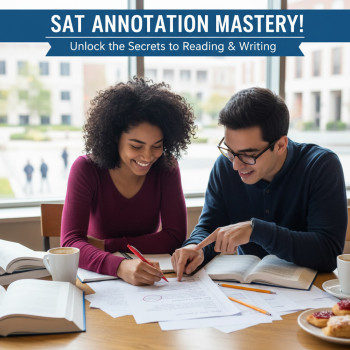
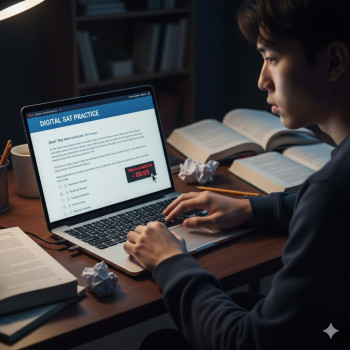


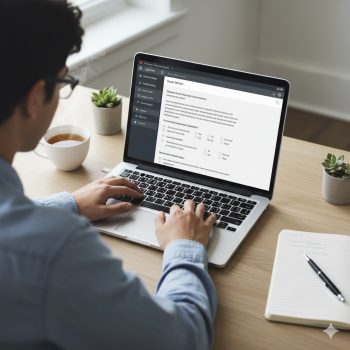








No Comments
Leave a comment Cancel